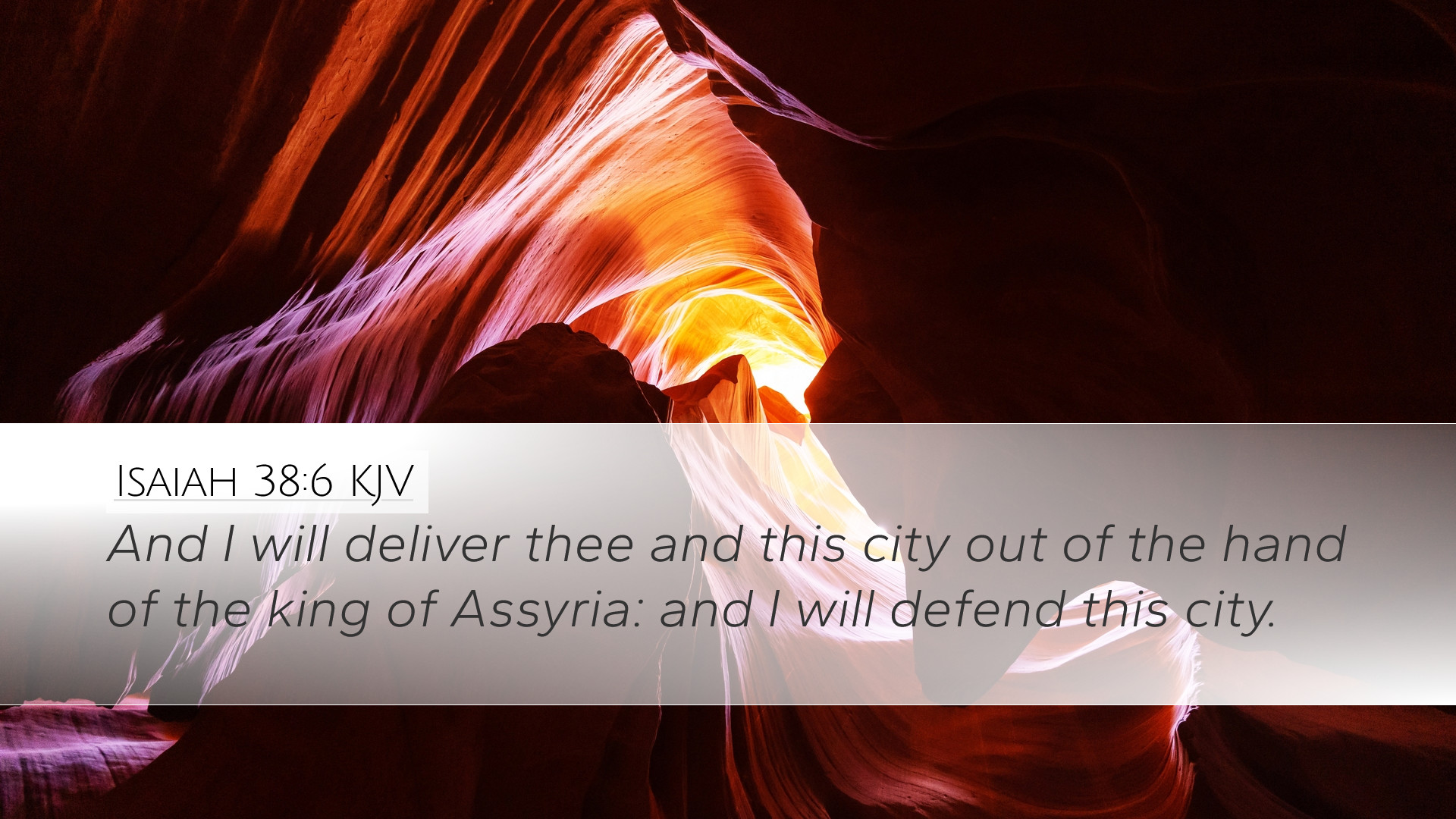Commentary on Isaiah 38:6
Verse Context: Isaiah 38:6 is part of a narrative that focuses on King Hezekiah of Judah. During a time of great distress, he finds himself facing a terminal illness, and the prophet Isaiah brings him dire news from the Lord. Yet, through fervent prayer and earnest supplication, Hezekiah seeks God's mercy, leading to the verse in question, where God promises to add fifteen more years to his life.
Overview of Interpretations
This verse has garnered various interpretations throughout theological history, emphasizing themes of divine mercy, the power of prayer, and providential care. Major commentaries provide richness in understanding its implications for both the historical context and personal application.
Insights from Matthew Henry
Matthew Henry notes the significance of prayer in Hezekiah's life as a response to his impending death:
- Prayer as a Means of Grace: Henry emphasizes that Hezekiah's earnest prayer was a direct appeal to God's character of mercy. His lamentation is seen not merely as an expression of sorrow but as a deep spiritual engagement reflecting true dependence on God.
- Divine Assurance: The promise of extended life illustrates God's willingness to respond to heartfelt prayers. Henry points out that such responses from God should encourage believers to approach Him with confidence in their times of need.
- Lessons on Sovereignty: Even in the face of death, God's sovereignty is not hindered. Henry remarks that God has the ultimate authority over life and death, and He can change circumstances—actions underscoring His divine will.
Insights from Albert Barnes
Albert Barnes offers a detailed look at the theological and moral implications of this verse:
- God’s Mercy and Willingness to Heal: Barnes stresses that this verse reflects the character of God as merciful and compassionate. The additional fifteen years serve to illustrate God's mercy over human affliction.
- Hezekiah’s Restoration and Its Symbolism: The healing of Hezekiah symbolizes the broader restoration that God can bring. Barnes connects this restoration with the greater redemptive narrative in Scripture, showing how God’s interventions reveal His love and promises.
- Moral Responsibility: Barnes highlights the importance of Hezekiah's response to God's mercy. He argues that while God is gracious, believers must also recognize their moral duty to live righteous lives in gratitude for such grace.
Insights from Adam Clarke
Adam Clarke approaches the verse with a focus on textual analysis and historical context:
- Historical Context of Hezekiah’s Reign: Clarke contextualizes Hezekiah's actions within the larger narrative of Judah's history. His reign was marked by religious reform and a return to faithful worship, setting a backdrop for his appeal to God.
- Significance of the Number Fifteen: Clarke delves into the significance of the fifteen additional years. He interprets the number as symbolizing completeness in God’s plan for Hezekiah and Judah, reflecting the enduring nature of God's promises.
- Role of Prophecy: Clarke emphasizes the prophetic element present in the narrative; the interaction between Isaiah and Hezekiah serves as a reminder of the vital role of prophets in conveying God’s messages to His people.
Theological Reflections
When reflecting on Isaiah 38:6, several theological themes emerge that are noteworthy for pastors, students, theologians, and Bible scholars:
- The Power of Intercessory Prayer: Hezekiah’s prayer exemplifies the power of fervent prayer before God. This aspect encourages believers to approach God with their requests, demonstrating the importance of personal and communal intercession.
- Dependence on God’s Will: The narrative illustrates the need for believers to seek divine intervention in times of crisis while understanding the complexities of God's sovereign will. It challenges them to trust in God’s goodness amid trials.
- Hope and Restoration: The verse brings hope to those in despair. God’s willingness to extend Hezekiah’s life serves as a promise that even in grievous situations, God is capable of restoration, awakening hope in believers for their circumstances.
- Moral Implications of Grace: The extension of life raises questions regarding the ethical implications of grace. What does it mean to be granted unsolicited mercy? This reinforces the necessity to live lives reflective of gratitude and obedience.
Conclusion
Isaiah 38:6 not only recounts a historical event but also serves as a profound theological reminder of God's nature, the efficacy of prayer, and the realities of His intervention in human affairs. Engaging deeply with this verse allows for rich theological reflection and offers lessons that remain highly relevant to contemporary faith practices.


